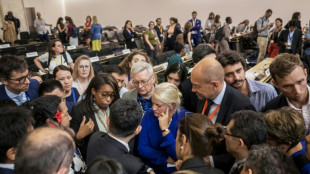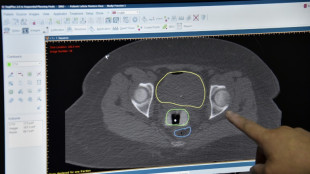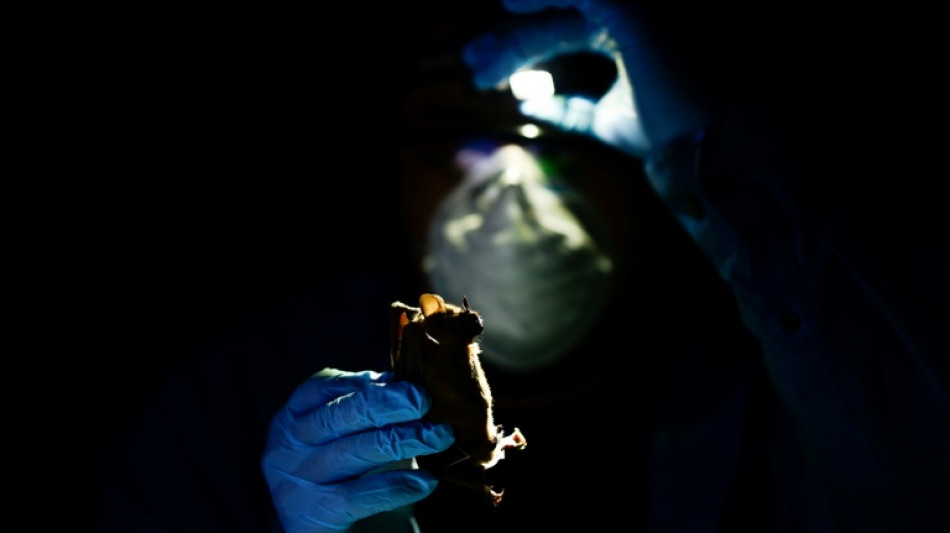
-
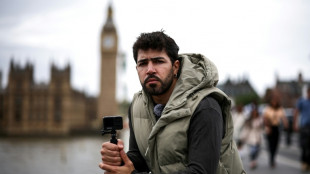 'Pickypockets!' vigilante pairs with social media on London streets
'Pickypockets!' vigilante pairs with social media on London streets
-
From drought to floods, water extremes drive displacement in Afghanistan
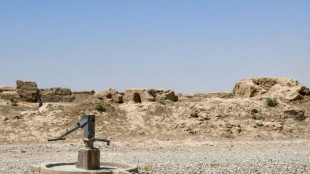
-
 Air Canada flights grounded as government intervenes in strike
Air Canada flights grounded as government intervenes in strike
-
Women bear brunt of Afghanistan's water scarcity
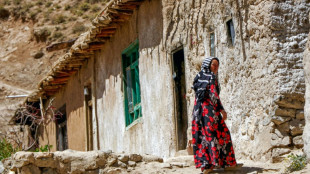
-
 Reserve Messi scores in Miami win while Son gets first MLS win
Reserve Messi scores in Miami win while Son gets first MLS win
-
Japan's Iwai grabs lead at LPGA Portland Classic

-
 Trump gives Putin 'peace letter' from wife Melania
Trump gives Putin 'peace letter' from wife Melania
-
Alcaraz to face defending champ Sinner in Cincinnati ATP final

-
 Former pro-democracy Hong Kong lawmaker granted asylum in Australia
Former pro-democracy Hong Kong lawmaker granted asylum in Australia
-
All Blacks beat Argentina 41-24 to reclaim top world rank

-
 Monster birdie gives heckled MacIntyre four-stroke BMW lead
Monster birdie gives heckled MacIntyre four-stroke BMW lead
-
Coffee-lover Atmane felt the buzz from Cincinnati breakthrough

-
 Coffe-lover Atmane felt the buzz from Cincinnati breakthrough
Coffe-lover Atmane felt the buzz from Cincinnati breakthrough
-
Monster birdie gives MacIntyre four-stroke BMW lead

-
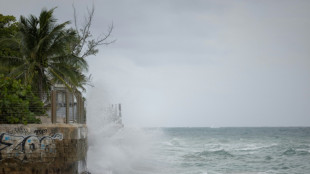 Hurricane Erin intensifies offshore, lashes Caribbean with rain
Hurricane Erin intensifies offshore, lashes Caribbean with rain
-
Kane lauds Diaz's 'perfect start' at Bayern

-
 Clashes erupt in several Serbian cities in fifth night of unrest
Clashes erupt in several Serbian cities in fifth night of unrest
-
US suspends visas for Gazans after far-right influencer posts

-
 Defending champ Sinner subdues Atmane to reach Cincinnati ATP final
Defending champ Sinner subdues Atmane to reach Cincinnati ATP final
-
Nigeria arrests leaders of terror group accused of 2022 jailbreak

-
 Kane and Diaz strike as Bayern beat Stuttgart in German Super Cup
Kane and Diaz strike as Bayern beat Stuttgart in German Super Cup
-
Australia coach Schmidt hails 'great bunch of young men'

-
 Brentford splash club-record fee on Ouattara
Brentford splash club-record fee on Ouattara
-
Barcelona open Liga title defence strolling past nine-man Mallorca

-
 Pogba watches as Monaco start Ligue 1 season with a win
Pogba watches as Monaco start Ligue 1 season with a win
-
Canada moves to halt strike as hundreds of flights grounded

-
 Forest seal swoop for Ipswich's Hutchinson
Forest seal swoop for Ipswich's Hutchinson
-
Haaland fires Man City to opening win at Wolves

-
 Brazil's Bolsonaro leaves house arrest for medical exams
Brazil's Bolsonaro leaves house arrest for medical exams
-
Mikautadze gets Lyon off to winning start in Ligue 1 at Lens

-
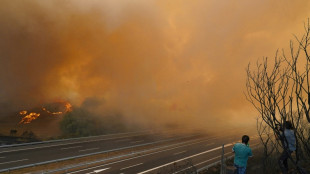 Fires keep burning in western Spain as army is deployed
Fires keep burning in western Spain as army is deployed
-
Captain Wilson scores twice as Australia stun South Africa

-
 Thompson eclipses Lyles and Hodgkinson makes stellar comeback
Thompson eclipses Lyles and Hodgkinson makes stellar comeback
-
Spurs get Frank off to flier, Sunderland win on Premier League return

-
 Europeans try to stay on the board after Ukraine summit
Europeans try to stay on the board after Ukraine summit
-
Richarlison stars as Spurs boss Frank seals first win

-
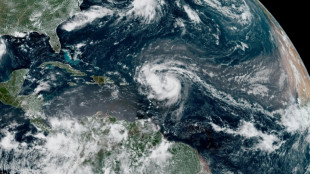 Hurricane Erin intensifies to 'catastrophic' category 5 storm in Caribbean
Hurricane Erin intensifies to 'catastrophic' category 5 storm in Caribbean
-
Thompson beats Lyles in first 100m head-to-head since Paris Olympics

-
 Brazil's Bolsonaro leaves house arrest for court-approved medical exams
Brazil's Bolsonaro leaves house arrest for court-approved medical exams
-
Hodgkinson in sparkling track return one year after Olympic 800m gold

-
 Air Canada grounds hundreds of flights over cabin crew strike
Air Canada grounds hundreds of flights over cabin crew strike
-
Hurricane Erin intensifies to category 4 storm as it nears Caribbean
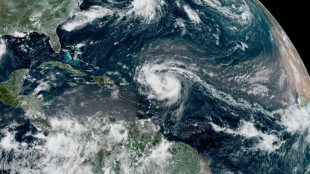
-
 Championship leader Marc Marquez wins sprint at Austrian MotoGP
Championship leader Marc Marquez wins sprint at Austrian MotoGP
-
Newcastle held by 10-man Villa after Konsa sees red

-
 Semenyo says alleged racist abuse at Liverpool 'will stay with me forever'
Semenyo says alleged racist abuse at Liverpool 'will stay with me forever'
-
In high-stakes summit, Trump, not Putin, budges

-
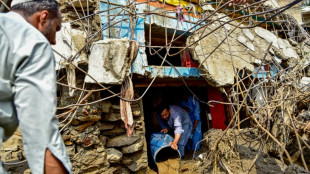 Pakistan rescuers recover bodies after monsoon rains kill 340
Pakistan rescuers recover bodies after monsoon rains kill 340
-
Hurricane Erin intensifies to category 3 storm as it nears Caribbean
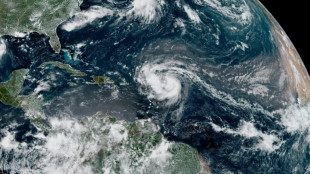
-
 Ukrainians see 'nothing' good from Trump-Putin meeting
Ukrainians see 'nothing' good from Trump-Putin meeting
-
Pakistan rescuers recover bodies after monsoon rains kill 320


In Mexican jungle, scientists prepare for future pandemics
As night fell in Mexico's Yucatan jungle, veterinarian Omar Garcia extracted blood and fluids from a bat as part of an investigation aimed at preventing the next potential pandemic.
The goal of the Franco-Mexican project is to detect diseases -- known as zoonoses -- transmitted from animals to humans in tropical climates.
Bats are under scrutiny from the international scientific community as a possible source of coronavirus transmission.
The winged mammal remained immobile while bearing its fangs, before being released by Garcia, a vector-borne disease expert.
Scientists from France's Research Institute for Development (IRD) and the National Autonomous University of Mexico (UNAM) have been collaborating in the study since 2017, using a modern laboratory in Merida, the Yucatan state capital.
The aim is to discover how different viruses that circulate between animals such as mammals, birds and rodents, can potentially pass to humans, said Audrey Arnal, an infectious diseases expert at the IRD.
"This is zoonosis... understanding what the consequences of human contact with wildlife could be and then understanding what could be the next epidemic that can come out of nature," she told AFP.
Scientists take samples of all kinds of animals from the rich ecosystem of the tropical rainforest, where they have identified 61 species of mosquitoes.
"We have many questions" to try to "complete the history of the transmission cycle" of viruses, said UNAM biologist Maria Jose Tolsa, who after a decade of research finally feels that the importance of her work is recognized.
"A pandemic has serious consequences for health and the economy," she said.
- High-risk zone -
The area was chosen for the research because rapid deforestation has made it "a highly emblematic region in terms of zoonosis emergency risks," said Benjamin Roche, a specialist in ecology and evolutionary biology at the IRD.
It is estimated that between 500,000 and 800,000 viruses could affect humans, he added.
The risks grow with the expansion of agriculture and tourism, which increase contact between animals and humans, according to researchers.
Thousands of trees have been felled in the Yucatan Peninsula to build President Andres Manuel Lopez Obrador's flagship tourist rail project, the Mayan Train, scheduled to start operating in December.
The government says that it is offsetting the loss with a tree-planting program and the creation of the second-largest tropical rainforest reserve in the world after the Amazon.
The key is to achieve a balance between humans and nature, Arnal said.
"The population have to live, eat and develop their economy," she added.
The research is being carried out in 12 communities across the three states that make up the Yucatan Peninsula.
"In birds we've found species that have been identified as reservoirs for the West Nile virus or influenza," said Rosa Elena Sarmiento, from the virology laboratory of the UNAM Veterinary School.
- 'Great revealer' -
Field work begins at dawn by placing a dozen fine nets to trap birds. At dusk it is the turn of bats and even owls.
Once caught, blood, fluid and ectoparasite samples -- if they carry them -- are taken.
Scientists identify the animal, measure it, record the data and check its condition before releasing it.
Later the material is analyzed in the laboratory.
"DNA is a great revealer," Arnal said.
"With the blood of the mosquito we can determine which species or which animal was bitten," she added.
Blood samples will also be taken from local residents to determine if they carry any virus that came from an animal.
The project also includes consultations with communities to learn about their environmental and social problems, and encourage forms of coexistence with nature.
"There has to be a knowledge dialogue with the communities," said Erika Marce Santos, a member of the Mexican Association of Conservation Medicine who liaises with residents.
The Merida laboratory is connected with others in Africa, South Asia and other Latin American countries within the framework of an initiative called Preventing Zoonotic Disease Emergence.
Launched by France in 2022, it brings together 22 countries and 200 organizations.
"What we're looking for in the Yucatan is to devise a prevention strategy against zoonoses that can serve as an example to the whole world," Roche said.
O.Bulka--BTB


